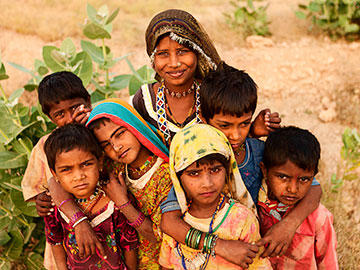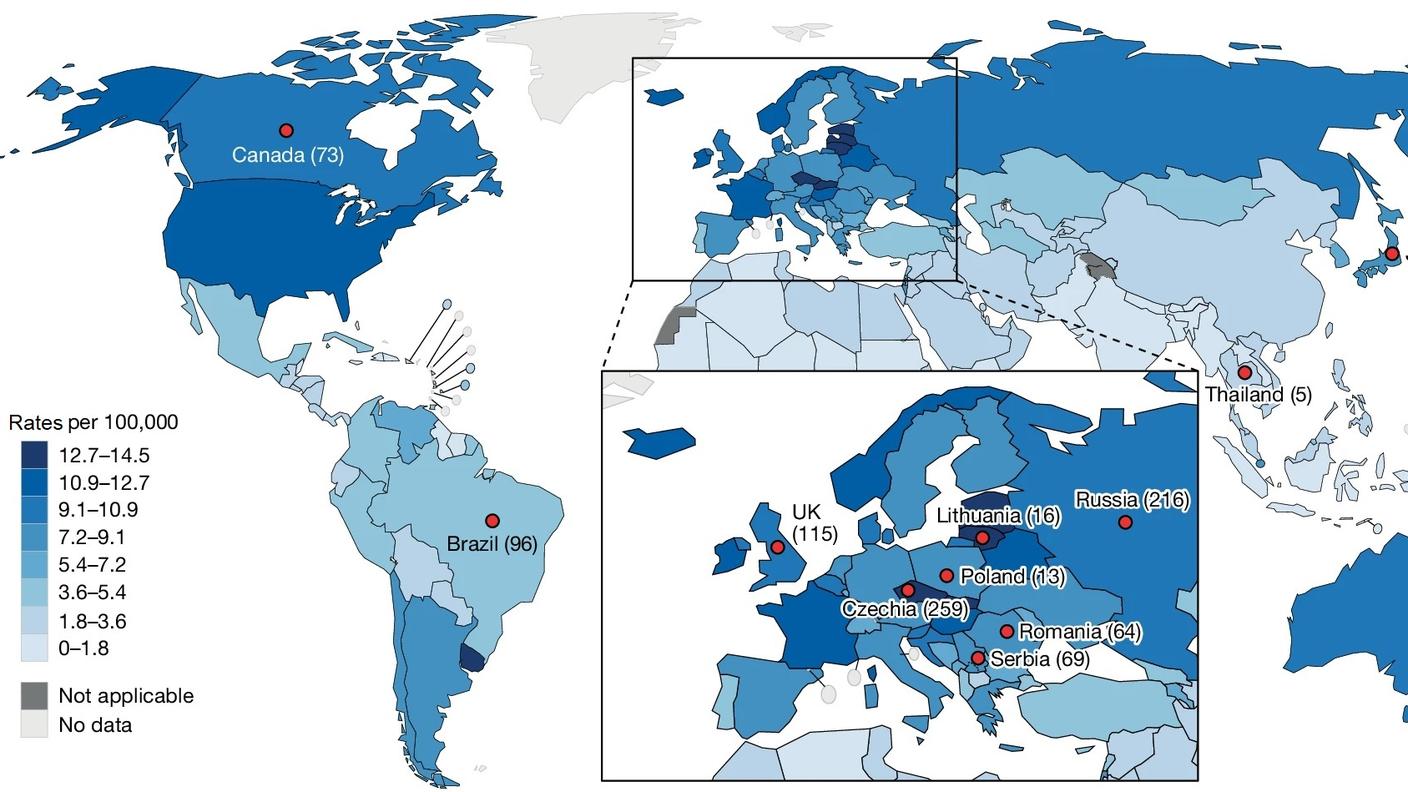Why Global Cancer Research Is Critical to Progress against the Disease
Cancer is increasingly a global health issue. In 2020, there were 19.3 million new cancer cases and nearly 10 million cancer-related deaths worldwide. The World Health Organization projects that, by 2040, the world could see 28.9 million new cancer cases and 16.2 million cancer-related deaths a year.
As premature death from infectious diseases and other causes has declined in low- and middle-income countries (LMICs)—and as obesity, inactivity, and tobacco use have become more common—cancer has become a more pressing health issue in these countries. Although LMICs have lower incidence rates of most types of cancer and cancer overall than developed countries, nearly 60% of the world’s cancer cases and more than 70% of cancer deaths in 2020 occurred in LMICs. Given population trends, those percentages are likely to rise in coming decades.
In 2012, the five most common cancers among men in LMICs were lung, liver, stomach, prostate, and colorectal cancers; among women, they were breast, cervical, lung, colorectal, and stomach cancers. Some cancers (such as liver, cervical, stomach) that are relatively more common in LMICs are caused by infectious agents.
The recognition that cancer is a major and increasing health problem in LMICs is driving efforts to help national governments take steps to address the problem. Countries may differ in their resources and ability to deliver health care services, but all can take steps to improve cancer prevention, screening, treatment, and supportive care.
Studying cancer internationally also has the potential to inform efforts to address cancer needs in the United States. For example, investigating patterns of cancer distribution in other countries may help shed light on the basis for observed racial/ethnic differences in cancer rates in the United States. In addition, studies of simple behavioral change approaches or screening methods that have been effective in LMICs may lead to interventions that can be used in high-income countries as well.
Opportunities in Global Cancer Research
Ministries of health and other national health policymakers in LMICs are increasingly partnering with government agencies, nongovernmental health organizations, and pharmaceutical and biotechnology companies in the United States and other high-income countries to develop national cancer prevention and control strategies, easily used diagnostic tools, and cost-effective access to effective treatments.
The international cancer research community has many opportunities to support efforts to reduce the impact of cancer in LMICs, including:
- helping to develop national cancer control plans that help LMICs meet their cancer prevention and control targets
- contributing to national tobacco control cessation efforts by sharing prevention and intervention strategies that have been successful in other countries (such as tax increases and bans on advertising)
- assisting LMICs in improving the uptake of vaccines against hepatitis B virus and human papillomavirus (HPV)
- improving access to HPV vaccines, cervical cancer screening, and treatment for high-grade cervical changes
- training health care workers to better diagnose and treat cancer
- developing drugs and vaccines that do not require refrigeration, as well as portable cancer screening and treatment clinics
- studying populations that are known to be at high risk of cancer, including cancers caused by infections, to risk reduction strategies
- studying indigenous plants or products for possible anticancer properties
- establishing biobanks to manage biospecimens for future research
Challenges in Global Cancer Research
Addressing the rising cancer incidence and death rates in LMICs is a challenge at multiple levels. Some regions have poor infrastructure, or people may not have access to basic health care. Other challenges include a lack of hospitals and clinics and a shortage of well-trained cancer doctors, nurses, and public health workers. Drugs and vaccines are sometimes in limited supply, and cancer diagnostic tools, screening equipment, and surgical facilities may be nonexistent.
Often, cancer patients in LMICs are not diagnosed until their disease is advanced, making treatment less effective and more costly. And palliative care, which is particularly important for people with advanced cancer, may be especially hard to come by in LMICs.
Behavioral interventions that have been successful in the United States and other high-income countries, such as graphic images on cigarette packages that discourage smoking, may be less acceptable or effective in other cultural contexts.
Furthermore, in some societies, cancer patients are stigmatized, or they may be fearful or distrustful of Western medicine.
Even as high-income countries place more emphasis on precision medicine, the high costs of the latest genomics-based cancer medicines and immunotherapies may limit their use in LMICs.
NCI's Role in Global Cancer Research
NCI’s Center for Global Health (CGH), plays a major role in NCI’s global cancer health efforts. CGH’s mission is to create sustainable international partnerships, to support programs that address global gaps in research and scientific training, and to disseminate information and best practices that drive improvements in cancer research and cancer control. CGH also works closely with other components of NCI that are active in global health efforts, both through the work of intramural scientists and through funding projects carried out by extramural researchers.
Cancer Control Planning
NCI’s many efforts in cancer control planning include joining the Centers for Disease Control and Prevention, the International Agency for Research on Cancer (IARC), and many other leaders in global health to form the International Cancer Control Partnership (ICCP). The goal of ICCP is to coordinate efforts to help countries develop and implement national cancer control plans.
The Tobacco Control Research Branch (TCRB), in NCI’s Division of Cancer Control and Population Sciences (DCCPS), supports research in many regions of the globe on patterns of tobacco use, the impact of tobacco control policies, and the effectiveness of prevention and cessation interventions in diverse settings. In addition to funding extramural research, TCRB participates in many collaborative research efforts with partners such as IARC.
Capacity Building
NCI’s Cancer Prevention Fellowship Program Summer Curriculum offers courses in molecular prevention, advances in cancer prevention, and principles and practices of cancer prevention. CGH nominates and provides financial support to international participants and facilitates networking and information sharing among international participants.
The Short Term Scientist Exchange Program promotes collaborative research between established US and foreign scientists from LMICs and upper-middle income countries by supporting exchange visits between US and foreign laboratories.
NCI’s Office of HIV and AIDS Malignancy (OHAM) supports activities that address the global burden of HIV/AIDS and HIV-associated malignancies, either as a main focus or as part of a larger endeavor. OHAM's international activities include the Strengthening Capacity for Research on HIV-Associated Malignancies in Sub-Saharan Africa and Other LMICs, an initiative supported by NCI and co-funded by the Fogarty International Center; the AIDS Malignancy Consortium, which conducts innovative trials for HIV-associated malignancies and is expanding its clinical trial activities in resource-poor areas with the National Institute of Allergy and Infectious Diseases’ AIDS Clinical Trials Group; and the AIDS and Cancer Specimen Resource, which is opening a biospecimen resource in Africa.
Global Cancer Research
In July 2016, NCI and Australia's Macquarie University, Children's Medical Research Institute, Garvan Institute of Medical Research, and Bioplatforms Australia Limited signed three Memoranda of Understanding (MOUs) to facilitate collaborations between research agencies and institutions in the United States and Australia for basic and clinical proteogenomic studies. The agreements will expedite the sharing of cancer research data, for use by researchers and physicians around the world, to advance cancer research and care. The MOUs will build upon the US Applied Proteogenomics OrganizationaL Learning and Outcomes (APOLLO) network and Australia's Proteome of Human Cancer.
NCI is also a partner in the United States–Latin America Cancer Research Network (US–LA CRN), through which it has formalized bilateral agreements with the governments of Argentina, Brazil, Chile, Colombia, Mexico, Peru, Puerto Rico, and Uruguay to increase their cancer research capacity.
And NCI supports efforts to develop low-cost technologies for global use, including portable technologies and telemedicine. The Request for Application (RFA): Cancer Detection, Diagnosis, and Treatment Technologies for Global Health supports the development and validation of technologies with the potential to increase early detection, diagnosis, and noninvasive or minimally invasive treatment of cancer.
The International Childhood Cancer Cohort Consortium, or I4C, is an NCI-supported alliance of several large-scale prospective cohort studies of children that pool data and biospecimens from individual cohorts to study various modifiable and genetic factors in relation to cancer risk.
A number of research projects in NCI’s Division of Cancer Epidemiology and Genetics are exploring risk factors that are of particular concern in LMICs. These include studies of nuclear accident clean-up workers in Ukraine, Estonia, and Latvia; benzene-exposed workers in China; Helicobacter pylori-infected individuals in Shandong, China; and children with Burkitt lymphoma in sub-Saharan Africa (the EMBLEM study).
DCCPS, through its Epidemiology and Genomics Research Program, funds a range of activities in the area of global health and cancer epidemiology. These activities address topics such as cancer and household air pollution from solid-fuel combustion, as well as cancer in Africa.
NCI’s Center for Cancer Research (CCR) conducts research projects that address cancers that are of special concern for LMICs. For example, CCR researchers are investigating the role genetic diversity plays in pediatric cancers in Central America. Others are studying the drivers of liver cancer and host genetic factors that increase susceptibility to nasopharyngeal carcinoma in populations with high incidences of these cancers.



